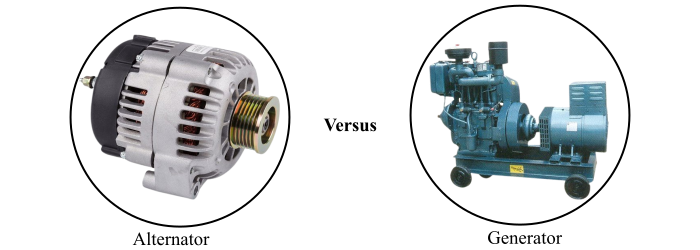
 Data Structure
Data Structure Networking
Networking RDBMS
RDBMS Operating System
Operating System Java
Java MS Excel
MS Excel iOS
iOS HTML
HTML CSS
CSS Android
Android Python
Python C Programming
C Programming C++
C++ C#
C# MongoDB
MongoDB MySQL
MySQL Javascript
Javascript PHP
PHP
- Selected Reading
- UPSC IAS Exams Notes
- Developer's Best Practices
- Questions and Answers
- Effective Resume Writing
- HR Interview Questions
- Computer Glossary
- Who is Who
Difference between Alternator and Generator
Both alternator and generator are types of electromechanical energy conversion devices that convert mechanical energy into electrical energy, however there are several differences in the way they operate.

This article will help you understand the major differences between an alternator and a generator. Let's start with a basic overview of what Alternators and Generators are.
What is an Alternator?
An electromechanical energy conversion device which converts mechanical energy into AC (alternating current) electrical energy is called an alternator.
An alternator consists of two main parts namely stator and rotor. The stator carries the armature winding whereas the rotor carriers the magnetic field winding or poles. When the rotor rotates, its magnetic field cuts the armature conductors and as a result of it an emf is induced in the armature winding. Since the magnetic poles (N and S) of the rotor alternatively cutting the armature windings, hence they induce an alternating (changing direction alternatively) emf in the armature. In this way, the alternator produces an alternating electricity.
The alternators are used in power generating station and automobiles, etc.
What is a Generator?
A generator is a general term used to represent an electromechanical energy conversion device which converts mechanical energy into electrical energy. This electrical energy may be in the form of AC (alternating current) or DC (direct current).
A generator consists of an armature and a magnetic field system. The relative motion between armature and magnetic field system generates electricity. In case of a generator, there may be a moving (or rotating) magnetic field system and a stationary armature (as in case of synchronous generator) or the moving armature and the stationary field system (as in case of a DC generator). Hence, a generator produces AC or DC electricity depending on its type.
Difference between Alternator and Generator
Both alternators and generators convert mechanical energy into electrical energy. However, there are several differences between them that are highlighted in the following table:
| Basis of Difference | Alternator | Generator |
|---|---|---|
| Definition | An electromechanical energy conversion device that converts mechanical energy into AC electrical energy is called an alternator. | An electromechanical energy conversion device that converts mechanical energy into electrical energy (AC or DC) is called a generator. |
| Types | There is no further classification of alternator. | A generator can be a DC generator and an AC generator. |
| Output current | The output current of an alternator is always an alternating current (AC). | The output current of a generator can be either AC or DC. |
| Efficiency | The efficiency of an alternator is comparatively high. | The efficiency of a generator is lower than that of an alternator. |
| Magnetic field | In an alternator, the magnetic field is produced by the rotor and it is rotating inside the stator. | In a generator, the magnetic field may be produced by the rotor as in a synchronous generator or stator as in case of a DC generator. |
| Polarization | Alternators do not require polarization after installation. | A generator has to be polarized after installation. |
| Movement of armature | The armature of an alternator is stationary. | The armature of a generator may be stationary (as in synchronous generator) or rotating (as in DC generator). |
| Size | The size of an alternator is comparatively smaller. | Generators are larger in size. |
| Speed (RPM) | Alternators have a wide range of speed. | The range of speed for a generator is comparatively less. |
| Conversion of energy | Alternators convert more mechanical energy into electrical energy. | Generators convert comparatively less amount of mechanical energy into electrical energy because its efficiency is less. |
| Applications | Alternators are mainly used in automobile industries as a charging system for the batteries. | Generators are used to produce electrical energy at large scale. |
Conclusion
The most significant difference between an Alternator and a Generator is that an Alternator can generate alternating current (AC) electricity only, whereas a Generator can produce AC as well DC electricity depending on the type of the generator.

